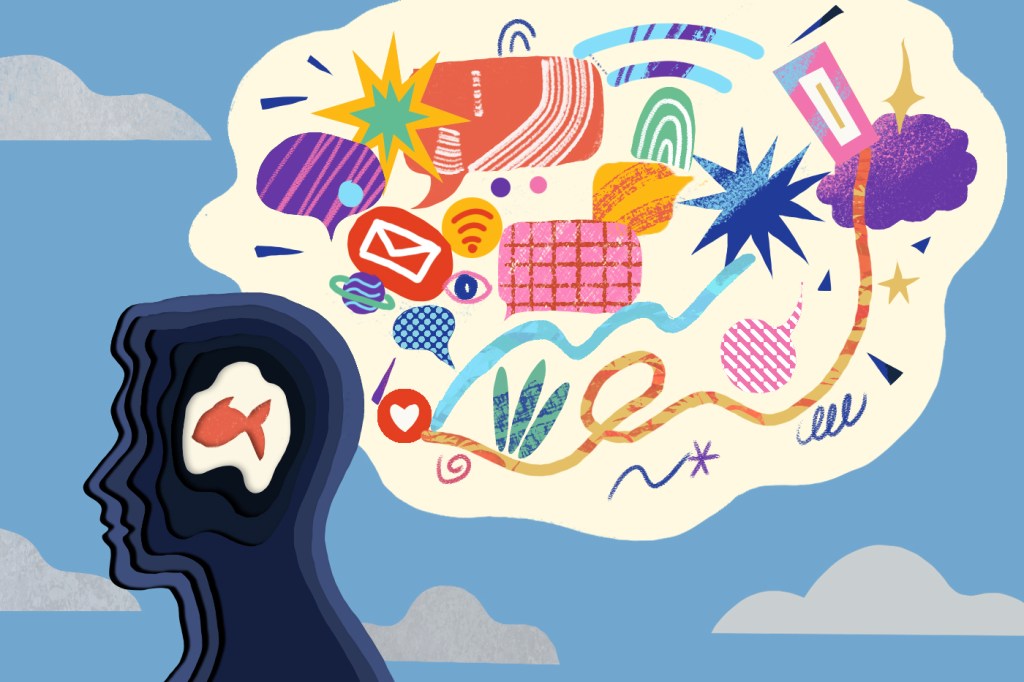Squirrel! Why attention spans seem to be shrinking and what we can do about it

No, the average human attention span is not shorter than a goldfish’s.
But research suggests the average attention span may be decreasing, and that may be problematic, says Northeastern University professor Art Kramer.
“Most of us think we’re good at multitasking,” says Kramer, professor of psychology and director of the Center for Cognitive and Brain Health at Northeastern. “We’re pretty terrible at it, overall.”
Computer scientists and psychologists have been studying attention spans for about 20 years, over which time the average time that a person can focus on one thing has dropped from around 2½ minutes to around 45 seconds.
Kramer says exact numbers can fluctuate, but research has certainly suggested that we can’t pay attention as well as we used to.
He cited a number of reasons.
First, is the constant bombardment of information that we receive.
“We used to watch the news when we came home in the evening, maybe also in the morning,” Kramer says. “Now you can get that information in real time — in fact it may pop up on your screen.”

Indeed, our screens are now everywhere. Not just in our living room or office, but in our hands and in our cars.
“I think a lot of changes in vehicles — cars, trucks, what have you — have led to difficulty in focusing on what’s in front of you,” Kramer says. “Vehicles were once so simple: no GPS, radio only, etc. Now, most young people can’t even drive stick (manual transmission) automobiles anymore.”
Kramer notes that a former Ph.D. student, David Strayer, found the “infotainment” technology on new cars to be as distracting as texting and driving.
Moreover, Kramer notes the ability to find information is just a click away — meaning that a distraction — or “anything that takes your mind and efforts away from what you’re trying to accomplish,” as Kramer defines it — can quickly usurp a previous task and refocus your attention.
Scientists can see this happening by examining the brain with an MRI or other non-invasive brain imaging techniques such as eye tracking or recording electroencephalographic information with electrodes placed on the head.
“There have been a whole bunch of neural networks — over 20 — that have been mapped out that relate to different aspects of memory, reasoning, problem-solving, attention and so forth,” Kramer explains. “We’ve in the past looked at the ability to multitask and what networks are activated and which networks are overactivated when you’re trying to do more than you can do.”
That being said, “there are a number of factors that can improve aspects of attention, processing speed, memory, reasoning, problem-solving,” Kramer says.
Some are simply by eliminating distractions like turning off the notifications on your phone or closing the multiple tabs open on your computer, or putting phones away.
“Handheld phones being outlawed while driving is a good start,” Kramer says — but, he adds, no panacea.
“Even if you’re not looking at it when you’re on the phone, focusing on a conversation with a boss or partner can be distracting,” Kramer says.
Featured Posts
Other methods of improving attention involve training.
Mindfulness is one popular method.
Lifestyle changes may prove to be effective.
For instance, scientists have found a relationship between physical fitness and better attention.
“As people improve their cardiorespiratory fitness a multitude of positive changes occur in brain function that improve many cognitive functions including the ability to screen out distractions,” Kramer notes.
He also suggested taking up a new instrument or learning a new language as a way for a person to continue enhancing their minds. Reducing stress and getting enough sleep also helps people successfully deal with distractions, Kramer says, and social interaction, and maybe even eating healthily, also seems to help people improve attention.
“There are a number of things we can do to both maintain and to enhance our ability to do well on various tasks that involve perception, cognition, motor activities, which certainly includes attention,” Kramer says. “In many ways attention we can think of as the glue that puts everything else together, because if you can’t attend to something, how could you expect to ever remember it because you haven’t attended to it.”
But Kramer notes a debate over whether mindfulness, attention training and exercise is applicable in real-world situations or just in well-controlled studies. And can you really ever eliminate distractions?
“Our world these days is just full of distractions and there are certainly ways to limit those distractions with focused and divided attention training, mindfulness training, and increasing cardiorespiratory fitness” Kramer says. “But do the training benefits transfer from these well designed studies to real world tasks and skills?”
As for the common bogeyman of social media, Kramer sees no direct impact.
“It can be distracting; it doesn’t have to be distracting,” Kramer says. “If I’m focused on talking to a friend, whether on Facebook, X, or in person makes no difference.”










